KARACHI: The Sabin Vaccine Institute (Sabin), a Washington DC-based advocacy group that works on expanding vaccine access and uptake globally, on Wednesday announced grants for five research teams, including two from Pakistan, to explore social drivers of COVID-19 misinformation and design solutions to increase vaccine acceptance.
Through this funding, the institute is encouraging collaborative, on-the-ground relationships between academic researchers, health officials and local communities.
Five research teams in India, Kenya, Pakistan and Uganda will separately receive up to $30,000 to carry out research and pilot a small-scale intervention in their respective communities over a period of 10 months, according to a statement issued by the institute.
“Research projects were selected based on a rigorous application and review process, including review by Sabin Vaccine Institute experts and global experts from the immunization, global health, and social science fields,” Kaitlin Christenson, vice president of Vaccine Acceptance and Demand at Sabin, told Arab News in an email on Wednesday.
“We are pleased to feature two projects from outstanding researchers in Pakistan among our 2020 grantees, each of which was selected because of the strength of their research design and the potential for their findings to help improve vaccine acceptance in Pakistan and around the world.”
One Pakistani team will lead a virtual research project to study perceptions of, and barriers to, childhood vaccination among health care workers and caregivers at a peri-urban site in Karachi. A second team will explore misinformation surrounding COVID-19 and vaccination among urban slum dwellers in Landhi Town, Karachi.
The first research team, headed by Abdul Momin Kazi, assistant research professor in paediatrics and child health at Aga Khan University in Karachi, will also explore the role of mobile health-based interventions and social media on improving childhood immunization during COVID-19.
Dr. Fauzia Aman Malik, PhD, MSc, special adviser to the dean for global health research initiatives at Yale University, will serve as the co-investigator on the project.
The second team, headed by Rubina Qasim, MSc, a lead researcher and lecturer at Dow University of Health Science in Karachi, will employ a co-design approach, working with community members to design and implement appropriate intervention addressing COVID-19 misinformation and its impact on the acceptance of a COVID-19 vaccine.
The grants are part of Sabin’s Social and Behavioral Interventions for Vaccination Acceptance Small Grants Program, which provides funding to researchers in low- and middle-income countries to better understand the social drivers of vaccination and design small-scale interventions to assess their impact on vaccination acceptance.
“Each research project funded by the Sabin Vaccine Institute is expected to contribute to our understanding of the social drivers of vaccine acceptance across country and local-level contexts, with a particular focus on low- and middle-income countries,” Christenson said. “The grantees’ research findings, detailing what drives individuals to accept vaccines in specific contexts, move us toward a global future free from preventable disease.”
Pakistan among four nations to receive prestigious grant to investigate COVID-19 misinformation
https://arab.news/c72k2
Pakistan among four nations to receive prestigious grant to investigate COVID-19 misinformation
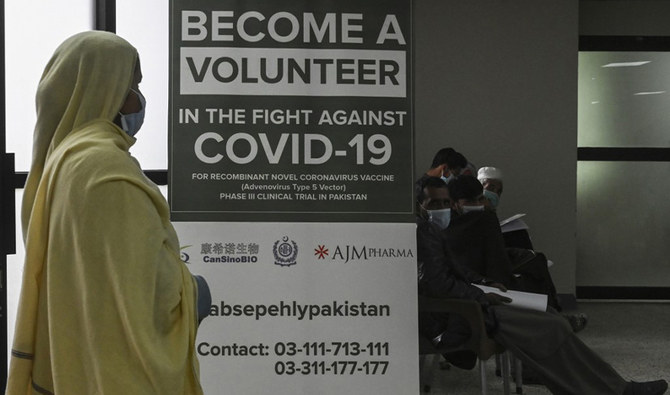
- DC-based Sabin Vaccine Institute has announced grants for five research teams including two from Pakistan
- The teams from Pakistan, India, Kenya, Uganda will receive up to $30,000 for conduct research over 10 months
Pakistan’s planning minister discusses enhanced educational ties with UK delegation
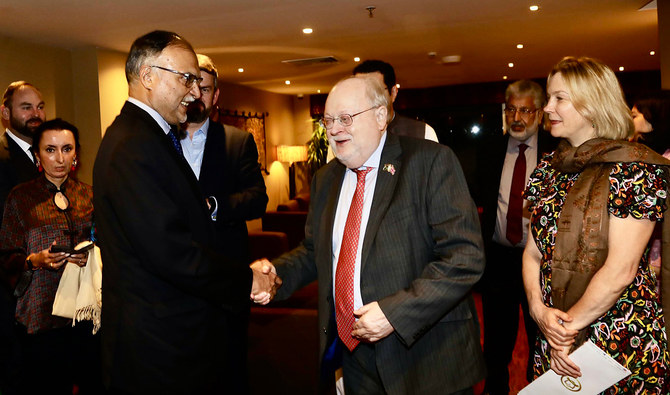
- Ahsan Iqbal proposes faculty training, research collaboration and UK campus expansions in Pakistan
- He says UK universities should develop specialized knowledge clusters through Pakistani scholars’ expertise
ISLAMABAD: Pakistan’s planning minister Ahsan Iqbal met a delegation from the United Kingdom, said an official statement on Thursday, to discuss the possibility of fostering closer ties and enhancing collaboration between the educational institutions in both countries.
British universities are a popular destination for Pakistani students due to the quality of education and the strong historical and cultural ties between the two countries.
Many students from Pakistan go to these educational institutions on scholarships offered by various organizations, such as the British Council, UK government and universities themselves, while others fund their studies independently.
The Pakistani planning minister presented various recommendations during his meeting with the delegation led by Steve Smith, the UK government’s International Education Champion, along with officials of the British High Commission.
He proposed faculty training programs to bolster academic expertise across borders, encouraging UK universities to establish campuses in Pakistan to promote educational accessibility and harnessing the expertise of Pakistani scholars in British universities to develop specialized knowledge clusters on the country.
“Pakistan envisions a future where universities in Pakistan are categorized into the Champions League (having first-tier universities) and the National League (having second-tier universities), driving excellence and accessibility in higher education,” Iqbal said during the meeting.
He highlighted the imperative for joint research initiatives, pointing at the importance of establishing joint research groups and fostering collaborations between PhD scholars from both countries.
The visiting delegation official reaffirmed the British government’s commitment to building international partnerships in education, citing the presence of over 20,000 Pakistani students in his country and 8,000 students who are pursuing degree programs in Pakistan with UK’s financial support.
The two sides also discussed procedural issues while pointing to the need for streamlined regulations, with a particular emphasis on minimizing hurdles for universities and strengthening the link between research institutions and economic growth.
They agreed to hold further dialogue and take concrete action toward implementing the planning minister’s recommendations to further solidify the foundation for enduring academic cooperation between the two countries.
US ambassador optimistic about Pakistan-IMF talks ahead of key funding meeting on April 29
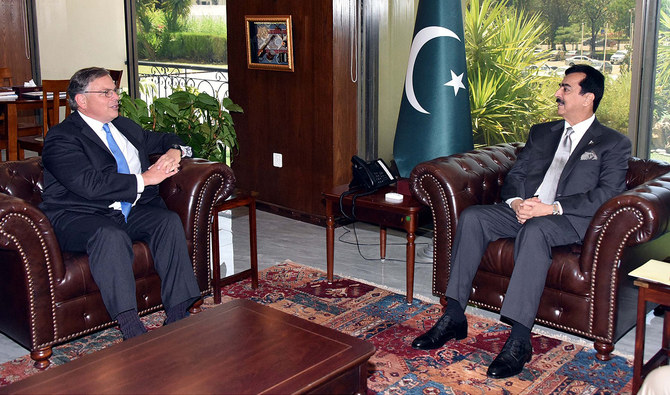
- The IMF has confirmed its executive board’s meeting to discuss the approval of $1.1 billion for Pakistan next week
- Ambassador Blome says the IMF’s positive feedback will further encourage investors and help Pakistan’s ailing economy
ISLAMABAD: US Ambassador Donald Blome expressed optimism over the ongoing negotiations between Pakistan and the International Monetary Fund (IMF) on Wednesday, as the global lending agency confirmed its executive board meeting for April 29 to discuss the approval of $1.1 billion funding for the South Asian state.
The funding is the second and last tranche of a $3 billion standby arrangement with the IMF, which it secured last summer to avert a sovereign default and which runs out this month. Pakistan is now seeking a new long-term and larger IMF loan, with finance minister Muhammad Aurangzeb saying Islamabad could secure a staff-level agreement on the fresh program by early July.
Ambassador Blome praised the performance of the country’s economic team in a meeting with the newly elected Senate chairman, Yousaf Raza Gillani, at the Parliament House wherein he also discussed strengthening of US-Pakistan bilateral relations.
“Acknowledging the positive economic indicators of Pakistan, Ambassador Blome noted the downward trend in inflation and high dollar reserves, stating that the IMF’s positive feedback would encourage investors,” said an official statement issued after the meeting. “He highlighted the flourishing gaming industry in Pakistan and called for enhanced [US-Pakistan] cooperation in the digital sector.”
The American envoy also noted the potential for further economic cooperation between the two countries in his conversation.
Pakistan’s $350 billion economy faces a chronic balance of payment crisis, with nearly $24 billion to repay in debt and interest over the next fiscal year — three-time more than its central bank’s foreign currency reserves.
Pakistan’s finance ministry expects the economy to grow by 2.6 percent in the current fiscal year ending June, while average inflation is projected to stand at 24 percent, down from 29.2 percent in fiscal year 2023/2024. Inflation soared to a record high of 38 percent last May.
With input from Reuters
In Rawalpindi, 77-year-old tea shop named after India’s Ludhiana is still a hit with customers
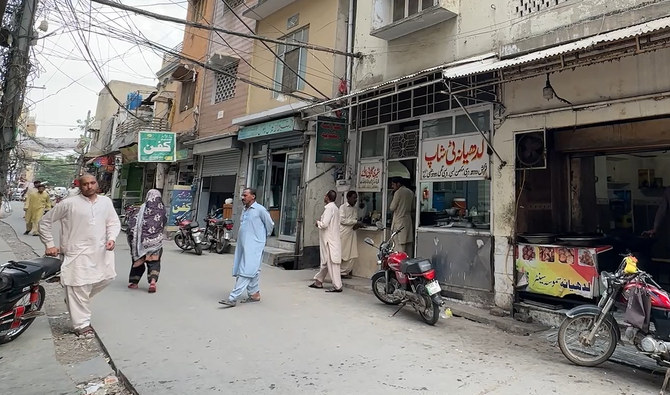
- Ludhiana Tea Shop owners migrated from India’s northwestern city at the time of Partition in 1947
- Customers say they come from far-off places to relish the taste of tea at the shop which they find unique
RAWALPINDI: At a small tea shop in Pakistan’s garrison city of Rawalpindi, Nazir Hussain pours piping hot tea from a kettle into small cups and hands them away to eager customers, many of them regulars who have been frequenting the shop for decades.
This is the scene from a typical evening at Ludhiana Tea Shop, located in the narrow streets of Rawalpindi’s old Lal Kurti area. The tea shop takes its name after the northwestern Indian city of Ludhiana, from where its owners migrated to Rawalpindi in 1947.
“My grandfather named this business in the memory of his hometown in India,” Hussain, who took charge of the shop in 1976, told Arab News, adding that he also sold dairy products and ghee.
“We are a family of milk sellers,” he said. “In India, we used to do the same. We were milk sellers and we used to own buffaloes.”
The shop has been serving tea to customers for the past 77 years. Agha Asghar Saeed, 72, is one of them and has been coming here since he was young.
“I was born here. I spent my childhood here, my youth and now my old age as well,” he told Arab News. “I’ve been having this tea since then.”
During the Muslim holy month of Ramadan, Saeed would break his fast at home but have tea at Ludhiana Tea Shop.
“I am addicted to this tea,” he explained.
But what inspires such loyalty in customers?
“You have to buy good quality milk,” Hussain said, adding that he purchased pure and organic milk for his shop that was a bit expensive. “Not everyone knows how to buy good milk.”
He maintained that most milk sellers in Pakistan did not sell pure milk, making him take several sips while buying to check the fat content.
Just like the milk, he continued, the quality of the tea leaves was also important.
The price of one cup of tea used to be around five paisas several years ago.
“Now, we sell it for Rs60 (22 cents),” he added.
The rich taste of Ludhiana Tea Shop means Muhammad Hasnain and his friends visit it every day rather than go to other tea shops in the neighborhood.
“Obviously, everybody wants a good bang for their buck,” Hasnain told Arab News. “The most important thing for anyone is that the quality should be good, and both quality and quantity are good here.”
Ludhiana Tea Shop offers customers deep-fried sweet and savory snacks, such as pakoras, samosas, jalebis and spring rolls, delectable items popularly consumed in Pakistan with tea.
Muhammad Shoaib Khan, a man in his 30s, informed he visited the shop with his friends at least a couple of times every day.
“We come on our bikes and travel for at least 1.5 kilometer on every trip,” Khan told Arab News. “It roughly adds up to 6 kilometers.”
Despite the cost of petrol, which has surged in recent times, Khan said he visited the shop for tea because it was worth it.
Hussain said he understood why customers came from far-off places just to have a cup of tea at his 77-year-old shop.
“Everyone cannot make good tea,” he said. “They don’t pour their heart in it. They lack passion. Making good tea is something that can only be done from the heart.”
Malala Yousafzai vows support for Gaza after backlash over Broadway musical
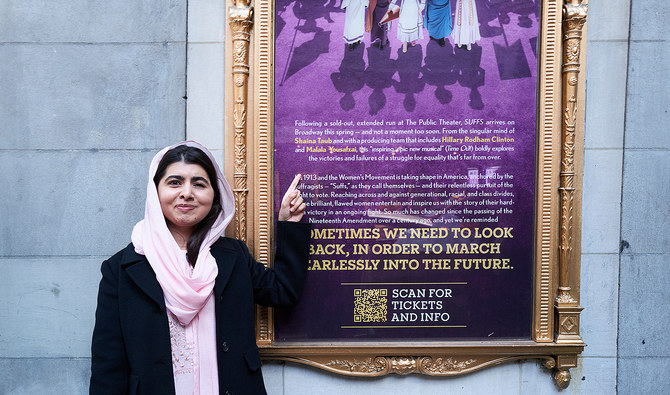
- Yousafzai was criticized in Pakistan for co-producing a play with Hillary Clinton who supports Israel’s Gaza campaign
- The Nobel laureate says ‘we do not need to see more dead bodies’ to understand the urgency of a ceasefire in Gaza
LAHORE: Nobel laureate Malala Yousafzai on Thursday condemned Israel and reaffirmed her support for Palestinians in Gaza, after a backlash in her native Pakistan over a Broadway musical she co-produced with former US Secretary of State Hillary Clinton.
Yousafzai, who was awarded the Nobel Peace Prize in 2014, has been condemned by some for partnering with Clinton, an outspoken supporter of Israel’s war against Hamas.
The musical, titled “Suffs,” depicts the American women’s suffrage campaign for the right to vote in the 20th century and has been playing in New York since last week.
“I want there to be no confusion about my support for the people of Gaza,” Yousafzai wrote on X, the former Twitter. “We do not need to see more dead bodies, bombed schools and starving children to understand that a ceasefire is urgent and necessary.”
She added: “I have and will continue to condemn the Israeli government for its violations of international law and war crimes.”
Pakistan has seen many fiercely emotional pro-Palestinian protests since the war in Gaza began last October.
Yousafzai’s “theatre collaboration with Hillary Clinton – who stands for America’s unequivocal support for genocide of Palestinians – is a huge blow to her credibility as a human rights activist,” popular Pakistani columnist Mehr Tarar wrote on social media platform X on Wednesday.
“I consider it utterly tragic.”
Whilst Clinton has backed a military campaign to remove Hamas and rejected demands for a ceasefire, she has also explicitly called for protections for Palestinian civilians.
Yousafzai has publicly condemned the civilian casualties and called for a ceasefire in Gaza.
The New York Times reported the 26-year-old wore a red-and-black pin to the “Suffs” premier last Thursday, signifying her support for a ceasefire.
But author and academic Nida Kirmani said on X that Yousafzai’s decision to partner with Clinton was “maddening and heartbreaking at the same time. What an utter disappointment.”
The war began with an unprecedented Hamas attack on Israel on October 7 that resulted in the deaths of around 1,170 people, according to an AFP tally of Israeli official figures. Hamas militants also abducted 250 people and Israel estimates 129 of them remain in Gaza, including 34 who the military says are dead.
Clinton served as America’s top diplomat during former president Barack Obama’s administration, which oversaw a campaign of drone strikes targeting Taliban militants in Pakistan and Afghanistan’s borderlands.
Yousafzai earned her Nobel Peace Prize after being shot in the head by the Pakistani Taliban as she pushed for girls’ education as a teenager in 2012.
However, the drone war killed and maimed scores of civilians in Yousafzai’s home region, spurring more online criticism of the youngest Nobel Laureate, who earned the prize at 17.
Yousafzai is often viewed with suspicion in Pakistan, where critics accuse her of pushing a Western feminist and liberal political agenda on the conservative country.
Pakistan commends UAE leadership for ‘swift’ response to record-breaking rains
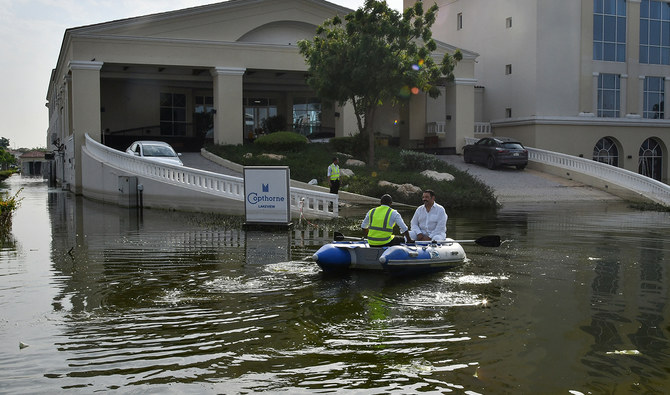
- Pakistan’s foreign minister telephones UAE counterpart, expresses sympathy over devastation caused by torrential rains
- Heavy rains lashed UAE last week, turning streets into rivers and hobbling Dubai airport, world’s busiest for global passengers
ISLAMABAD: Pakistan’s Foreign Minister Ishaq Dar on Wednesday commended the United Arab Emirates (UAE) leadership for its swift and efficient response to the devastation caused by record-breaking rains in the desert country.
Heavy rains lashed the desert country last week, turning streets into rivers and hobbling Dubai airport, the world’s busiest for international passengers.
The rainfall was the UAE’s heaviest since records began 75 years ago, dumping two years’ worth of rain on the desert country.
“Foreign Minister Ishaq Dar held telephone conversation with Foreign Minister His Highness Sheikh Abdullah Bin Zayed of United Arab Emirates to express deepest sympathy on the devastation caused by recent torrential rains,” Pakistan’s Ministry of Foreign Affairs (MoFA) said.
“He commended the leadership of the UAE for the swift, efficient and timely administrative response to this natural calamity,” it added.
The foreign ministry said both representatives also exchanged views on matters of bilateral and global importance.
Pakistan’s PM Sharif last Friday telephoned UAE President Sheikh Mohamed bin Zayed Al-Nahyan, urging both countries to collaborate to tackle the impacts of climate change.
Sharif had lauded the UAE president for his “outstanding leadership qualities” and strong commitment to ensure the welfare of the Emirati people.
Pakistan has been prone to natural disasters and consistently ranks among one of the most adversely affected countries due to the effects of climate change. Torrential rains have killed more than 90 people in the South Asian country this month, according to authorities.










